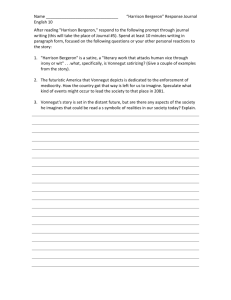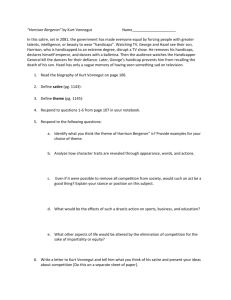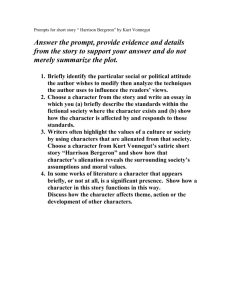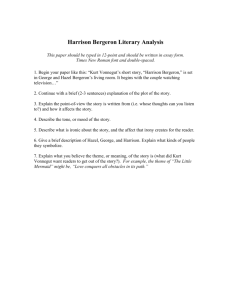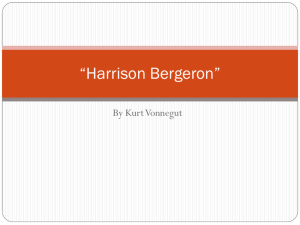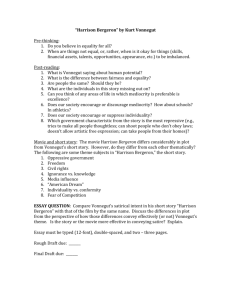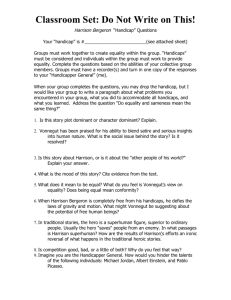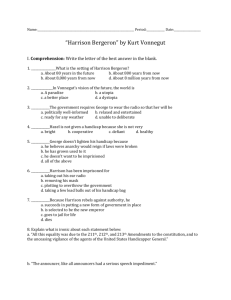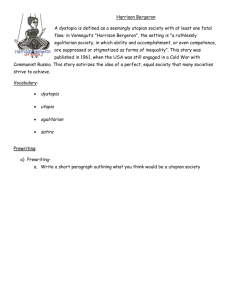Tommy Chiffriller October 23, 2012 Ms. Maurno Literary Analysis
advertisement
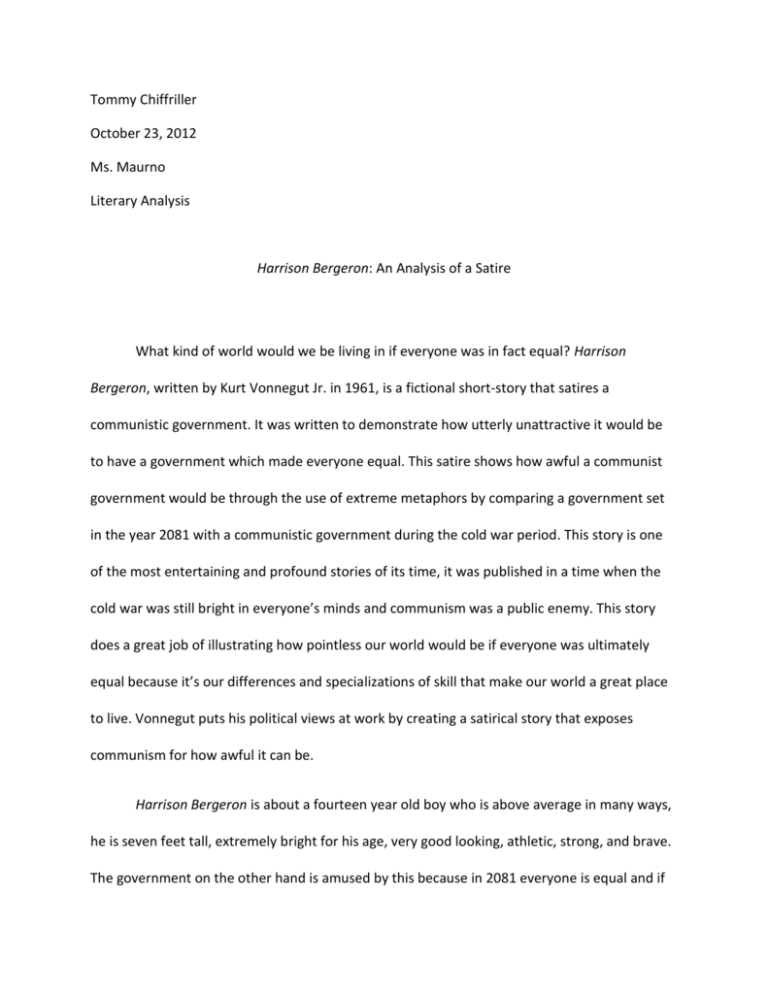
Tommy Chiffriller October 23, 2012 Ms. Maurno Literary Analysis Harrison Bergeron: An Analysis of a Satire What kind of world would we be living in if everyone was in fact equal? Harrison Bergeron, written by Kurt Vonnegut Jr. in 1961, is a fictional short-story that satires a communistic government. It was written to demonstrate how utterly unattractive it would be to have a government which made everyone equal. This satire shows how awful a communist government would be through the use of extreme metaphors by comparing a government set in the year 2081 with a communistic government during the cold war period. This story is one of the most entertaining and profound stories of its time, it was published in a time when the cold war was still bright in everyone’s minds and communism was a public enemy. This story does a great job of illustrating how pointless our world would be if everyone was ultimately equal because it’s our differences and specializations of skill that make our world a great place to live. Vonnegut puts his political views at work by creating a satirical story that exposes communism for how awful it can be. Harrison Bergeron is about a fourteen year old boy who is above average in many ways, he is seven feet tall, extremely bright for his age, very good looking, athletic, strong, and brave. The government on the other hand is amused by this because in 2081 everyone is equal and if someone is better than the worst then it is the “Handicapper General’s” job to make them equal through large handicaps. In an attempt at equalizing everything what really is lost are all forms of beauty, grace, and wisdom. Vonnegut uses this metaphor of the Handicapper General to compare it with large communist governments such as Russia during the cold war that was a powerful leader against the U.S. This absurd story about the dystopia arising from totalitarian governments comes straight out of popular cold war magazines. Vonnegut used these magazines to increase his popularity during this frenzied, anti-communism period in World history. Kurt Vonnegut is best known for his experiences during World War II and his employment at General Electric, which caused him to question many forms of bureaucracy and big government. He involves his writing mostly with victims of oppression such as in his other works like Slaughterhouse-Five. This satire is an attack on all forms of enforced equality that prevents an individual from striving to be the best that they can in the world. It also strives to expose communism, as a satirist it is Vonnegut’s job to take the relative norms to the extremes as has been done with poor Harrison who’s abilities are handicapped to make him equal in a world where equal means hardly being able to function and not even being able to contribute to society in a way that would make a difference. Vonnegut is an extremely good satirist and does a great job of using dialogue to explain where the characters stand in the story and how they are being affected by the handicapper general. Such as how Harrison’s mother is always saying that was a doozy and his father, using a figure of speech, says, you can say that again. Ms. Bergeron being very naïve and handicapped takes this literally and repeats her statement. This is the level of equality that is trying to be achieved by the handicapper general. These uses of dialogue and other such literary devices such as metaphor, give this relatively short, short story a profound political impact that other stories this short have been unable to do. It is through his mastery of satires that Vonnegut is able to expose the oppressive government that he so strongly distastes through his pen. Which gives much credit to the old saying the pen is mightier than the sword, for he has certainly changed many opinions about the meaning of “equality” through his literary works, which is quite an accomplishment for any man. Another interesting theme throughout Harrison Bergeron is the television. It is used centrally throughout the story to convey the plot between Harrison and his parents. It is portrayed throughout the story as being desensitizing and numbing through its ways of playing government controlled television that everyone must watch not unlike the roll that the television played in George Orwell’s historical novel 1984. You could even draw the comparison from 1984’s big brother to the Handicapper General as being a “big sister” who monitors everyone at all times and makes sure they are wearing their proper handicaps. These connections can be drawn throughout the story as both works of literature strive to have the same end affect, Communism is bad, forced equality is evil, and everyone should have at least the right to try and make a difference through their own individual talents. Vonnegut was a man bound for extreme social equality throughout his lifetime, believing that all men and women no matter what race or minority deserve the same social, economical, and political rights as everyone else in this country. During his University of Rhode Island graduation address, he commented on slavery as being “a social disease that unrecognized for the first one hundred years of American History. He then went on to say how only in his lifetime did there begin to become rights for women and minorities which is an utterly slow rate of reform. Harrison Bergeron exemplifies Vonnegut’s views through it uses of political satire and by demonstrating a world that although equal is not one that any man would want to live in. Vonnegut puts his political views at work by creating a satirical story that exposes communism for how awful it can be. He is an extremely talented writer who knows how to use his words to expose political tyranny and communism. Also he is able to create a story that is not very long but extremely powerful in meaning, he can do this through his acute use of metaphor and satire. Not only is he able to make a short but powerful story, but it is also extremely entertaining, being one of the most taught short stories in schools throughout the world. Kurt Vonnegut is an exceptional writer whose stories have helped shape the world that we live in today.
